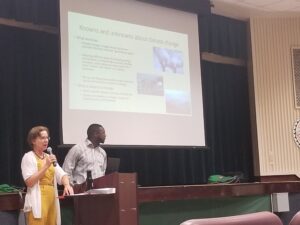
Climate change took center stage last Thursday when Florida A&M hosted a Sustainability Seminar for students, faculty and staff.
This collaborative event bewteen research coordinator Bruce Strouble, director of Sustainability Institute Kathryn Ziewitz and office manager Victoria Yancy, was the second event in the Sustainability Seminar Series.
Panelists Parks Camp, Michelle Dovil and Ziewitz gave brief overviews on how climate change impacts the state, both socialy and economically.
Ziewitz and Strouble shared the mic as they opened the seminar with alarming facts and data on how climate change has affected the Sunshine State.
“Impacts on community: land-use, housing transportation, threats to structures in low-line areas, that’s another significant challenge,” Strouble said.
Ziewitz added: “Here’s what we know, every scientific report shows that climate change has been accelerating and is largely driven by human activity.”
Ziewitz said that modern-day pollution has caused an increase in emitted greenhouse gases and explained these dangerous elevations could be decreased by reducing society’s carbon footprint.
“That (carbon footprint) is the way of taking a snapshot of our individual actions, how much carbon went in to do that,” Ziewitz said.
A carbon footprint is the amount of greenhouse gases, specifically carbon dioxide, that are emitted into the atmosphere based on the consumption of fossil fuels by a person or group. FAMU’s greenhouse gas inventory displayed what the university’s biggest contributor to its carbon footprint.
“Commuting – that’s our biggest contributor to carbon emission,” Ziewitz said.
Camp gave an overview of data and models that described climate versus weather and reginal impacts of climate change.
“For the weather, we are trying to predict the waves. For the climate, we are trying to predict the average water level,” said Camp.
Sociology assistant professor Michelle Dovil explained the social impacts of climate change.
“What happens when people are displaced due to a lack of water supply, due to droughts? What happens when there are wildfires,” Dovil said. “Not only do we have refugees in the context of war, but we also have climate refugees.”
More seminar panels in this series have been scheduled for later this semester. “We have several more (seminars); we have one coming up on plastics, we will have one coming up on the role HBCUs play on the sustainability movements,” Strouble said. “We intend to make this a much bigger effort going forward to represent what FAMU’s going to be doing to address sustainability issues across the state and across the planet.”